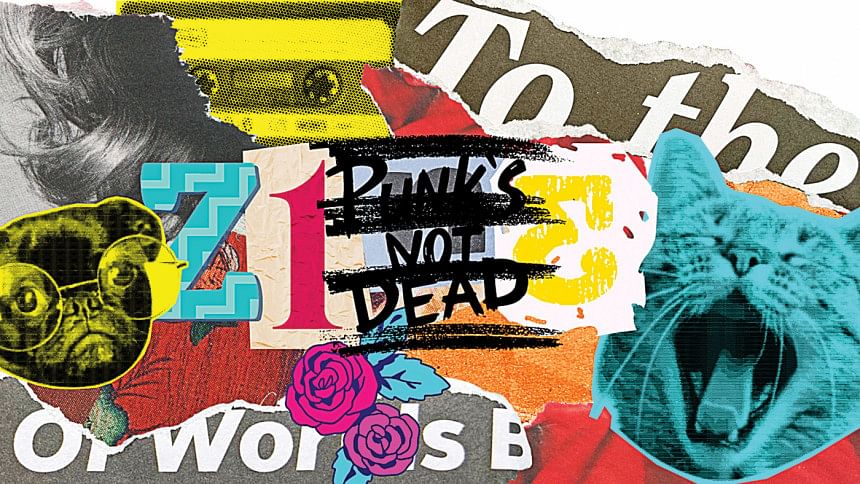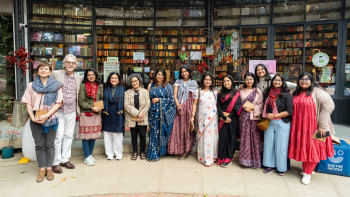100 feminist zines to shake, inspire, and soothe you

This year, to celebrate Sister Library Dhaka turning four, we acquired a collection of 100 zines curated by the library's founder, Aqui Thami. The collection will be available for reading at the Goethe-Institut library from June onwards. With the acquisition of this collection, we are finally connected to the mothership Sister Library in Bombay.
Zines are traditionally low-cost, do-it-yourself publications that are made, reproduced and distributed by an independent maker. A zine can be dedicated to any subject or topic and challenges the status-quo (which is no monolith thing but a multitude of statuses, notions, ideas, products, systems, and policies to keep power consolidated with the same group of people). A zine challenges the notion that change is not possible; that things will always be the way they are; that people's actions, thoughts, and words don't shift the needle.
The tools of the zine maker can be as simple as a piece of paper, a marker and a photocopy machine. The space of the zine-maker is anywhere. Aqui, who has over a decade of experience in this tradition and comes to it through her parents making pamphlets and posters to protest occupation of indigenous lands in Darjeeling, explained that it's not just about zine-making but the whole process of creation, reproduction, distribution and the creation of a zine ecosystem that needs to be considered. Each of the curated 100 zines is living proof of the power of solidarity and community; from how to protest safely, cook wheatpaste, make kombucha to how to be an anarchist parent. A pocketful of adjectives can be used to describe the zine collection—it is subversive and supportive, it is radical and traditional, it is educational.
This collection challenges us, the curators of the Library. It does not fit into our institutional mode of operations. The zines are not permanent. They are not lendable. They are not archivable. They are not to be digitised. You, our dear readers and members, have to come to the library and read them there and then. And interact, react, make your own. For institutions like ours, this forces us to be more open and flexible, which is at once challenging and exciting (unimaginable, unplanned things can happen!). Some of the suggested ways of working with zines are having reading sit-ins, connecting to rural presses, acting as a distro (distribution centre), collaborative making.
A zine can be dedicated to any subject or topic and challenges the status-quo (which is no monolith thing but a multitude of statuses, notions, ideas, products, systems, and policies to keep power consolidated with the same group of people).
Currently the collection is in English and we hope that in the next months, through workshops, discussions, and reading sit-ins, zines will be made in the other languages of Bangladesh—they will be shared and will multiply. Zine makers are often anonymous and self-dependent, taking on the role of writer, visualiser, editor, printer, distributor. "When you hold a book you made in your hands, something shifts," Aqui mentions about the process of making a zine. It is a process of embracing self-reliance, independence, and letting go of the need for perfection.
There are some mighty pamphlets in the collection that are no more than photocopied pages of type. Others are elaborate art-works, screen-printed, and string bound. There is a zine that is smaller than the palm of your hand (Tips on Zine Making) and states that "You are never too old to make zines".
A zine is like a good embrace, intimate, timely, consensual. And ephemeral. We absorb the information, let go of the paper, create anew. Zines are an escape from a mainstream media that tells us to be, feel, think a certain way. "You Don't Meet Nice Girls In Copy Shops" reads the headline of the listicle for 'girls (and others, but mostly girls) who write zines'. They are like songs that break open the bell jar to hold you and inspire you to hold others.
A note of thanks to the Goethe-Institut Bangladesh for investing in this collection and Star Books and Literature for their partnership in activating the collection.
Come over to the Sister Library Pink Shelf on weekdays at the Goethe-Institut Library at Drik Bhavan!
Katerina Don is the curator of HerStory Foundation and together with Shoma Sharmin and Zaima Hamid Zoa hosts Sister Library Dhaka.

 For all latest news, follow The Daily Star's Google News channel.
For all latest news, follow The Daily Star's Google News channel. 








Comments